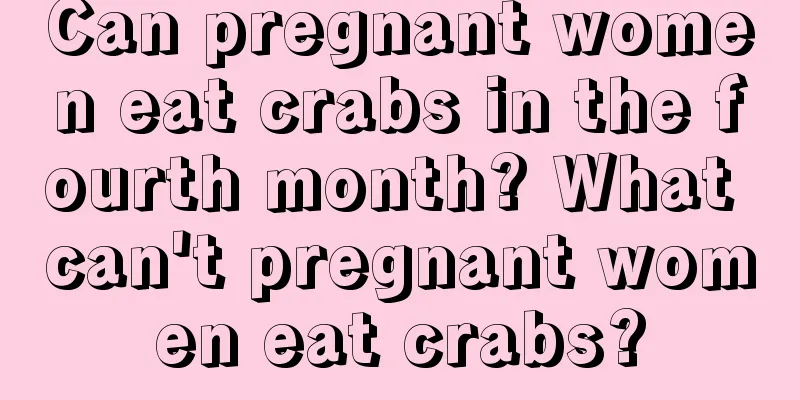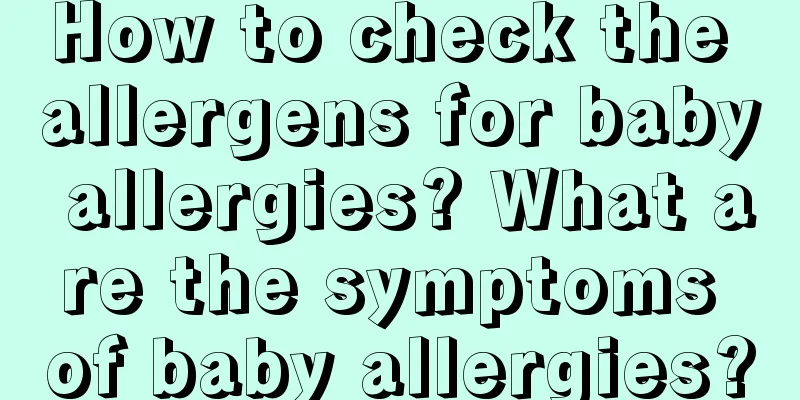Can pregnant women eat crabs in the fourth month? What can't pregnant women eat crabs?

|
There are many things that pregnant women need to pay attention to in their diet during pregnancy. Pregnant women can eat crabs, but there are some rules on how to eat crabs and how much to eat. Pregnant women must clean the crabs before eating them. Can pregnant women eat crabs in the fourth month?Four months of pregnancy means that you have already experienced the early stage of pregnancy, so the various reactions of the body will gradually disappear at this time, so you can improve your diet appropriately after four months of pregnancy. However, it is not recommended to eat crabs. The first reason is that crabs are easy to carry tiny bacteria, which is not very friendly to pregnant women. Moreover, the protein of crabs is difficult to absorb. It is better for pregnant women to eat light and comprehensive nutrition. In the fourth month of pregnancy, you need to supplement not only protein, but also various trace elements, such as calcium and zinc, which are all elements needed for the development of the fetus in the body. Although crabs and seafood have the unique nutrition and iodine of seafood, they are not very helpful for the development of the fetus. Pregnant women should eat more fish, lean pork and lean beef, as well as animal liver, and eat less seafood as much as possible. In addition to eating less seafood, pregnant women should also eat less fruits with strange nature and taste. It is recommended that in addition to the most basic eggs, meat and milk, it is best to eat more coarse grains and foods carrying crude fiber in the daily diet, which will help protect the intestines, promote the absorption of nutrients by pregnant women, and promote the supplement of minerals. What can't pregnant women eat crabs?Although crabs are not considered dangerous food for pregnant women and can be eaten appropriately during the second trimester, they can be quite dangerous for pregnant women if the ingredients are not properly matched. 1. Do not eat persimmons. Crabs and persimmons are both cold foods, and eating them together will cause vomiting, abdominal pain, and diarrhea. 2. Do not eat peanuts. Peanuts are high in fat and can cause diarrhea when eaten with crabs. 3. Do not eat pears. Pears and crabs are both cold in nature, and eating them together will damage the stomach and intestines. 4. Do not eat cantaloupe. Cantaloupe is also a cold food, and eating it with crabs will damage the stomach and intestines. 5. Do not eat loach. Loach and crab have opposite properties and flavors, so eating them together is not beneficial. 6. Do not eat mutton. The combination of the two will reduce the warming and nourishing effect of mutton, and at the same time cause spleen and stomach dysfunction and damage vitality. Precautions for pregnant women to eat crabsAlthough pregnant women can eat crabs, they should be extra careful when eating crabs. So before eating crabs, it is best for pregnant mothers to understand some precautions about eating crabs! 1. Do not eat crabs in the early stages of pregnancy. In the early stages of pregnancy, the baby's development is not perfect in all aspects, and it is a stage where miscarriage is very easy. Eating crabs at this time may irritate the mother's body and cause bad results. In addition, eating crabs in the early stages of pregnancy will affect the development of the baby's nervous system. 2. Don’t eat too much. In the second and third trimesters, pregnant mothers can eat some crabs to supplement protein. But it must be eaten in moderation. Don’t eat too much. Even normal people will have a great impact if they eat too much, let alone pregnant women. 3. Do not eat rotten or spoiled crabs. You should know that crabs are extremely easy to rot and spoil, and the crabs that pregnant mothers eat must be fresh, otherwise it is easy to cause physical discomfort. 4. They must be cooked thoroughly before eating. Crabs carry a lot of bacteria, and it is easy to get infected if you are not careful, so pregnant mothers must cook crabs thoroughly before eating them. Who knows what effect these bacteria will have on the baby? 5. Do not eat with cold foods. Crabs are cold in nature, and eating with cold foods can easily cause diarrhea. 6. Do not eat crab claws. You must not eat crab claws. Crab claws have a clear abortion effect on mothers in the early stages of pregnancy, and will also have a certain impact on mothers in the middle and late stages of pregnancy. What to do if a pregnant woman gets poisoned by eating crabsBecause crabs contain a lot of bacteria, if pregnant mothers eat crabs that are not fresh or not cooked thoroughly, it will cause some adverse reactions. At this time, pregnant mothers must pay attention! When pregnant mothers accidentally eat crabs and cause adverse reactions, they will experience symptoms of nausea, vomiting, and diarrhea. In severe cases, they will experience vomiting and diarrhea. At this time, they need to seek medical treatment in time. Sometimes, pregnant mothers are allergic to crabs and have some adverse reactions. At this time, they cannot use medicine indiscriminately. They need to use medicine after the doctor's diagnosis. When pregnant mothers don’t know that they are allergic to crabs, it is recommended to eat a little less to see if there are any adverse reactions. If not, they can eat some appropriately. |
<<: How to choose the size of children's shoes? Different ages have different selection focuses
>>: How to make baby rice cereal and the best baby rice cereal brands to choose
Recommend
What are the symptoms of premature birth? What should you pay attention to when you have premature birth?
Premature birth is a common phenomenon. There are...
Will baby thrush heal on its own? Misconceptions about treating baby thrush
Thrush is a common oral fungus disease in infants...
What is the effect of eating breakfast for children?
Eating breakfast can improve children's acade...
How much is a bottle of Calcium? Is Calcium taken orally or chewed?
Many children bring Calcium Trace back home to th...
How many days does it take for IVF to implant? The specific process of IVF
IVF is a life-saving straw for infertile couples....
Can a humidifier be placed at the bedside? Can a humidifier be placed under the air conditioner?
It is best not to keep the humidifier on all the ...
Is it good for newborns to drink more water? Be careful of water poisoning
Many mothers believe that "in addition to dr...
Why is painless childbirth not recommended? Does painless childbirth have any sequelae?
The topic of painless childbirth has recently aro...
What are the best names for babies in the Year of the Rat? The first choice for boys in the Year of the Rat
A nickname is a simple name called by family memb...
Can children eat ice cream when they have a fever? Can children eat ice cream when they have a cold and fever?
The child has a fever and the medicine is bitter....
A one-year-old girl accidentally got a screwdriver stuck in her brain while playing. How can we prevent children from getting hurt in our daily life?
Recently, it was reported that a one-year-old gir...
How old is the baby to stop feeding the bottle? What are the harms of not stopping feeding the bottle?
There are many things that new mothers need to le...
What should parents do if water gets into their baby's ears while bathing? Don't worry
Many new parents accidentally get water into thei...
How long should I wear a belly belt for a caesarean section? Is it good to use a belly belt for a caesarean section?
Women who have undergone cesarean section will ha...
What is sopfrology delivery? How to practice sopfrology delivery?
There are many ways for pregnant women to give bi...









